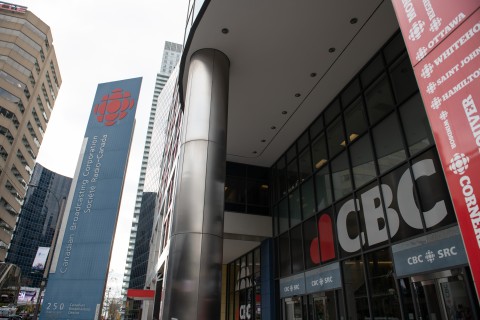
The Canadian Taxpayer Federation has rehashed its worn-out campaign to "defund the CBC" - this time with Conservative leader Pierre Pollievre as their eager mouthpiece. Changes in the CBC’s financing structure are a cause for concern, but not in the way the CTF wants you to believe. Amid the CBC’s plans to cut 10 percent of its workforce, it’s time for a rethink on how we fund our public media.
In the past decade, the CBC has substantially increased its reliance on advertising dollars. In 2022, the CBC’s ad revenue was $419 million, close to a record high not seen since 2014. While higher ad revenue means more money coming in, it also shifts the focus of who the CBC is accountable to. It moves our dedicatedly impartial news media in the dangerous direction of privatization.
An independent public broadcaster is a necessity for a thriving democracy, providing Canadians with shared access to high-quality local and national news and programming. The reality is, Canada may not be spending enough. Among developed nations, Canada consistently ranks amongst the lowest in per capita spending on public broadcasting. A 2020 report revealed Canada’s spending on public broadcasting to be just $33 per capita, $55 less than the global average. In the face of an evolving media landscape, the rise of digital platforms, and increased polarization, Canada needs to strengthen its public service media, not defund it.
The CBC serves as a crucial remedy to the growing blight of online disinformation, ensuring that diverse voices are heard and news is fact-checked. Defunding the CBC would further the chaotic fracturing of our media environment, ceding ground to digital media giants and deepening societal divisions. Strengthening the CBC is an investment in a more informed, connected, and resilient Canada.
We have the tools in our tax system to prioritize the public interest and ensure that Canada’s public broadcaster is produced for Canadians and funded by Canadians. Canada’s new Digital Services Tax, expected to come into effect in January 2024, is one such tool. Services like Google and Facebook, which have made significant profits in Canada virtually tax-free, will finally have to pay a minimal tax. Expanding Canada’s windfall profits tax on other large corporations, beyond banks and insurance companies, would bring in billions in new revenue.
The push for reduced public spending on the CBC is not just a mirage of fiscal prudence to save taxpayer dollars; it’s a calculated move to advance a particular political ideology that risks further polarization of our media landscape. We can access the revenue we need to fund our public broadcaster properly without hurting the average person’s pocketbook; we just need to choose tax fairness.
